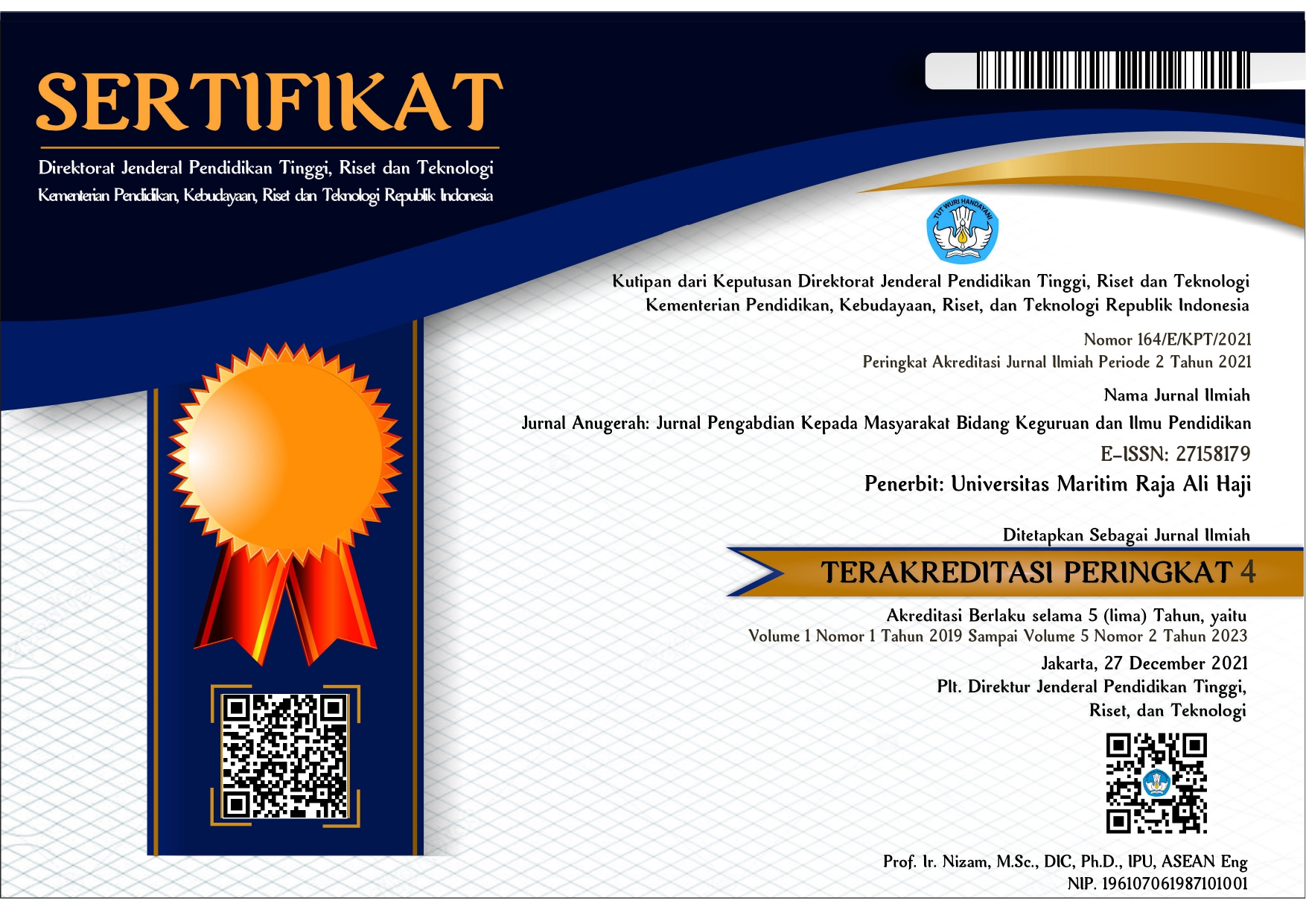Desain Pembelajaran Berbasis Literasi Sains dan Berwawasan Kemaritiman sebagai Hasil Pelatihan di SMAN 4 Tanjungpinang
DOI:
https://doi.org/10.31629/anugerah.v1i1.1580Keywords:
learning design, biology, chemistry, scientific literacy, maritimeAbstract
Learning designing becomes an important part of the process to achieve learning objectives. Likewise, when teachers enhancestudents’ scientific literacy, the efforts must also be made from the learning design. The design of learning based on scientific literacy becomes very important when the orientation of science learning is not just to achieve cognitive aspects, but even more to the students' ability to apply science and have the attitude and ability to make decisions related to science in their lives. One important aspect in the design of learning based on scientific literacy is the relevance of the context of science to concepts or knowledge. For students inKepulauan Riau, the maritime context is very relevant to be discussed in the body of science. Through intensive training at SMA Negeri 4 Tanjungpinang, biology and chemistry teachers were trained to design science literacy-based learning and maritime-based contexts. The learning design developed refers to the STL (science and technology literacy) approach which has 5 stages of learning, namely the contact stage, the elaboration stage (content), the curriculum stage, decision making, and the nexus stage. From the results of the mentoring by the training facilitator, 2 learning designs were produced (biology and chemistry subjects). The maritime context is integrated in the material Biodiversity (for Biology) and Petroleum (for Chemistry).
References
Diana, S., Rachmatullah, A., & Rahmawati, A.S. (2015). Profil kemampuan literasi sains siswa SMA berdasarkan instrumen Scientific Literacy Assesments (SLA). Prosiding seminar nasional XII Pendidikan Biologi FKIP UNS 2015. Retrieved from https://media.neliti.com/media/publications/171085-ID-none.pdf
Lestari, I.D. (2017). Pengaruh literasi sains terhadap kemampuan kognitif siswa pada konsep ekosistem. Prosiding Seminar Nasional Pendidikan FKIP UNTIRTA. Retrieved from .https://jurnal.untirta.ac.id/index.php/psnp/article/download/103-106/1715
OECD. (2013). PISA 2012 Assessment and analytical framework : Mathematic, reading, science, problem solving and financial literacy. OECD Publishing.
Snow, C. E., & Dibner, K.A. (2016). Science literacy concepts, contexts, and consequences. Washington (DC): National Academies Press (US).https://www.ncbi.nlm.nih.gov/books/NBK396090/pdf/Bookshelf_NBK396090.pdf
Wenning, C. J. (2011). The levels of inquiry model of science teaching. Journal Physics Teacher Education Online. 6(2):9-16.
Yulita, I. (2017). Analisis prekonsepsi siswa terhadap kemampuan menghubungkan konteks air laut dengan konten hakikat ilmu kimia kelas X SMA. Jurnal Pendidikan Sains, 6(1), 64-72. https://jurnal.unimus.ac.id/index.php/JPKIMIA/article/view/3130
Yulita, I. (2017). Desain bahan ajar berbasis literasi sains: hakekat ilmu kimia pada konteks air laut. Prosiding Seminar Nasional Kimia. Retrieved from seminar.uny.ac.id/semnaskimia/content/semnas2017















